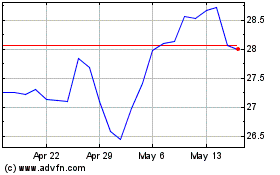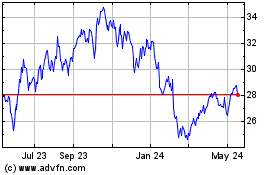Wind Power Write-Downs Cast Shadow Over Industry Outlook
November 01 2023 - 8:57AM
Dow Jones News
By Giulia Petroni
A wave of impairments is sweeping the wind-energy sector in the
U.S. and elsewhere amid high interest rates, inflation and
supply-chain woes, forcing developers to put off projects and
casting doubts over the industry's outlook.
Energy giants Oersted, BP and Equinor show the latest signs of
trouble.
The Danish developer said Tuesday that it booked $4 billion in
charges related to its U.S. offshore portfolio and abandoned the
development of two wind projects off the coast of New Jersey--Ocean
Wind 1 and 2--due to spiraling costs and supplier delays. Oersted
had previously flagged increasing risks for its projects in the
country, citing the lack of favorable progress on tax credits.
The decision came a week before legislative elections in New
Jersey, where wind turbines have become a top target for
Republicans against Democratic Gov. Phil Murphy's plan to have 100%
of the state's power coming from renewables by 2035.
"The industry isn't in a good shape," Stifel's vice president of
equity research for utilities and renewables, Martin Tessier, told
Dow Jones Newswires. "I think we'll see a softening of long-term
targets... and less projects will be developed in the long
term."
Governments around the world have set ambitious targets to
increase the share of renewables in their energy mixes, but their
plans are now under pressure as wind developers face a surge in
financing costs. Project owners usually sign long-term deals
outlining terms to sell electricity or secure subsidies before
construction starts. Some are now lamenting that these terms don't
reflect increased costs, and their projects aren't viable
anymore.
Earlier this week, BP booked a $540 million pretax impairment
charge on three wind projects off the coast of New York after
regulators rejected a bid to renegotiate power-purchase terms,
which the company requested to reflect inflationary pressures and
permitting delays. Equinor, BP's partner on the Empire Wind and
Beacon Wind projects, booked an impairment of around $300 million
on its U.S. portfolio. The companies said they are assessing the
impact of the regulators' decision on their future development
plans.
Other projects have also been canceled.
Iberdrola's subsidiary Avangrid scrapped power purchase
agreements for a 804-megawatt wind-farm project known as Park City
Wind in Connecticut due to financial challenges. SouthCoast Wind, a
joint venture between Shell New Energies US and Ocean Winds North
America, said it would terminate PPAs for a planned project in
Massachusetts due to a significant increase in projected capital
expenditures and finance costs. Ocean Winds was created by
Portugal's EDP Renovaveis and France's Engie.
Swedish developer Vattenfall said earlier this year that it saw
project costs climbing up to 40% after booking an impairment for
halting the development of the Norfolk Boreas wind farm in the U.K.
Germany's Siemens Energy said it sees its wind-turbine business
posting worse fiscal 2024 losses than market expectations as it
works through quality issues and ramp-up challenges in
offshore.
"The economics of wind are proving more difficult thanks to
higher costs of capital and higher interest rates," said Russ
Mould, AJ Bell's investment director, in a statement. "The laws of
physics are coming into play with regard to how the wind turbines
are made. They require large amounts of concrete, steel,
rare-earth-based magnets and lubricants to ensure they work
reliably in potentially hostile environments, but the costs are
going up, thanks to inflation, and this is taking its toll on
manufacturers."
But some projects are still moving forward. Oersted took a final
investment decision on Revolution Wind, an offshore 704-megawatt
project in Connecticut and Rhode Island. Utility Dominion Energy on
Tuesday received a key federal approval for its 2.6-gigawatt
offshore wind project in Virginia.
In Europe, policymakers recently released an action plan to
address the sector's mounting challenges, saying they are working
to ensure faster permitting, improved auction criteria, easier
access to finance and guarantees, as well as a more competitive
international environment. The European Union's plan was welcomed
as "a game-changer for the industry" by trade group WindEurope,
which called for action earlier this year amid high costs, long
permitting processes and rising competition from Chinese
manufacturers.
Write to Giulia Petroni at giulia.petroni@wsj.com
(END) Dow Jones Newswires
November 01, 2023 09:42 ET (13:42 GMT)
Copyright (c) 2023 Dow Jones & Company, Inc.
Equinor ASA (NYSE:EQNR)
Historical Stock Chart
From Dec 2024 to Jan 2025

Equinor ASA (NYSE:EQNR)
Historical Stock Chart
From Jan 2024 to Jan 2025
